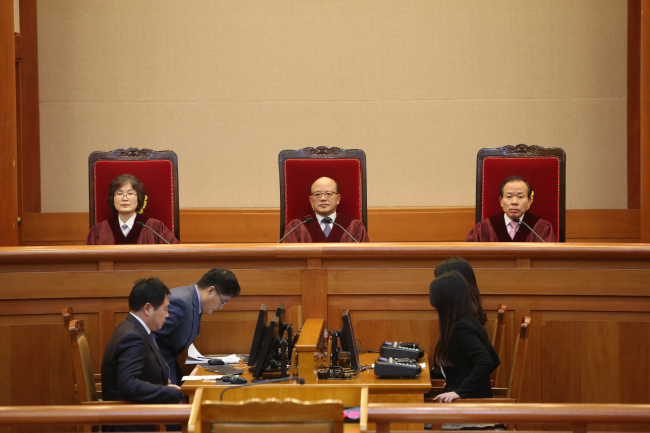The Constitutional Court refused Wednesday to review a petition by a Korean woman who challenged the constitutionality of a 1965 treaty to normalize ties between Seoul and Tokyo on the grounds that the treaty limited individual rights to seek compensation for colonial-era forced labor.
 |
| The Constitutional Court delivers a ruling over the constitutionality of a 1965 treaty to normalize relations between Seoul and Tokyo on Wednesday. (Yonhap) |
Under the treaty, Tokyo offered Seoul $5 million in free grants and loans, and has thus argued that “all compensation issues” were settled with the treaty. This has triggered a series of lawsuits from individual victims and their families demanding separate reparations.
Lee Yun-jae, the daughter of Lee Hwa-seop, mobilized by Japan for forced work in China in 1942, filed the petition in 2009, arguing that her family was not adequately compensated for her late father’s unpaid wages due in part to the treaty.
Lee argued that a government panel established under a local act to support the victims failed to reflect the current value of the Japanese currency when calculating the compensation in 2008.
She filed an administrative lawsuit to cancel the panel’s decision to offer Lee’s family 11.65 million won ($9,900) and applied for a constitutional petition against both the 1965 treaty and the local act to support the victims and their families.
But the Constitutional Court refused to judge on the constitutionality of the treaty that it said would not affect the administrative legal case, and said that the local act was constitutional. It said that the calculation at the time, which reflected the rise in consumer prices, was based on “reasonable” standards.
However, three of the nine judges voted against the local law, saying the government panel’s calculation of Lee’s unpaid wages did not correctly reflect the currency’s current value as it failed to take into account the economic growth rate.
The court ruling drew keen attention as it could influence bilateral relations between Seoul and Tokyo amid ongoing negotiations over the issue of Japan’s wartime sexual enslavement of Korean women.
Tokyo has long argued that all legal compensation issues were settled under the 1965 treaty based on Article 2 that stipulates that the problem concerning property, rights and interests of Korea, Japan and their nationals had been settled “completely and finally.”
But Seoul has claimed that the humanitarian issue involving former sex slaves was not on the agenda during the treaty negotiations, and that the sex slave issue should be handled separately.
The Supreme Court rendered in 2012 that it is hard to conclude that the individual victims’ rights to claim compensation were removed due to the normalization treaty.
Despite the 2012 ruling, Japanese firms that are engaged in lawsuits involving Korean victims of forced labor have refused to compensate the plaintiffs.
By Song Sang-ho (sshluck@heraldcorp.com)

